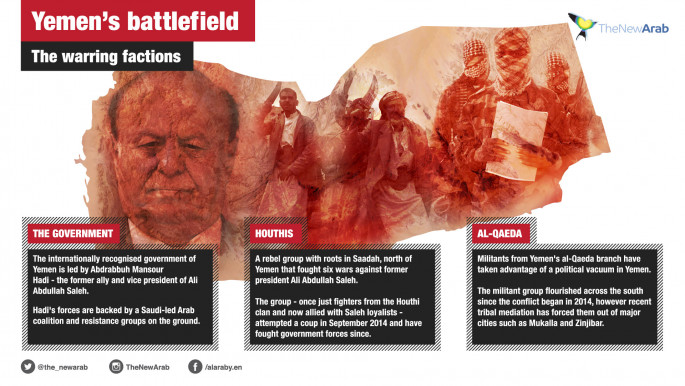Clashes erupt in Yemen as nation awaits midnight truce
Intense clashes flared across Yemen hours before a UN-brokered ceasefire was due to begin on Wednesday, as global pressure continues to mount on factions involved in the two-year conflict.
Heavy fighting, involving heavy artillery and air raids killed at least five people across the country on Wednesday, including near the Saudi border and around the capital Sanaa, military sources said.
Meanwhile in the northern Saada province, military sources said rebel positions were struck by coalition raids also on Wednesday. At least three strikes also hit a convoy of rebel reinforcements in Imran province, north of Sanaa.
At least two loyalists were killed and 15 wounded in fighting near the Red Sea, in Hajja province, the sources said.
In Taiz, at least two rebels and a pro-government fighter were killed during overnight fighting, according to witnesses and military sources.
More than 10,000 have been killed - more than half of them civilians - while another three million are displaced and millions more need food aid.
On Sunday, UN special envoy for Yemen, Ismail Ould Cheikh Ahmed, announced a truce to begin from 23:59 (2059 GMT) on Wednesday, which is expected to last for an initial three days, subject to renewal.
The truce will be the sixth attempt to end the bloodshed since a Saudi-led Arab coalition intervened in March 2015 to support the government of President Abed Rabbo Mansour Hadi after rebels overran much of Yemen.
The last ceasefire attempt began in April alongside UN-brokered peace talks in Kuwait but both the rebels and the coalition accused each other of breaches.
After the collapse of the peace talks in August, fighting escalated across much of the country until an October 8 coalition air strike which the UN said killed more than 140 people and wounded at least 525 at a funeral in Sanaa.
The United States announced an "immediate review" of its intelligence and refuelling assistance to the coalition, whose investigative team then released unusually quick findings from a probe of the incident.
It said a coalition aircraft "wrongly targeted" the funeral based on "incorrect information".
Civilians have paid the highest price in a country that was already the Arabian Peninsula’s poorest state.
A United Nations report said airstrikes by the coalition were suspected of causing around half of all civilian deaths, while rebel-affiliated groups were responsible for about a quarter.
On Tuesday, US Secretary of State John Kerry hailed the announcement of the new truce and echoed an urgent plea from the UN envoy for unfettered humanitarian access throughout Yemen.
"We ask the parties to take all steps necessary to advance the implementation of this cessation, call on them to sustain it, and strongly encourage its unconditional renewal," Kerry said.
Hadi's government said it would agree to the truce if rebels also adhered to it, and also called for the insurgents to monitor the ceasefire and end their siege of Yemen's third city, Taiz.
The rebels, in a statement on Tuesday night, expressed readiness for a "lasting ceasefire, comprehensive and without conditions".
In spite of Wednesday's violence, Mustafa Alani, a senior adviser to the Gulf Research Centre, said the prospects for peace were growing.
"I am more optimistic, actually, because the environment is completely different from the previous one," he told AFP.
"At the same time, both parties in the conflict are getting tired. The cost of the conflict - human, financial - is very high. Both parties believe they cannot win, they cannot settle it by military means."
In another major development, the US Navy for the first time targeted the Houthis directly this week, destroying the rebels’ radar sites which the Washington alleges were used launch on US warships and other vessels.
Yemen's Houthi rebels are allied with members of the security forces loyal to ex-president Ali Abdullah Saleh.
The alliance controls the capital Sanaa and other strategic territories in Yemen, but the coalition-backed forces managed to push them back from the southern port of Aden and adjacent areas.
Both the rebels and pro-government forces have come under increased international pressure to silence their guns.
Kerry said the international community "will continue to work with all parties to conclude a negotiated settlement" to the conflict.
![Yemen Houthis [AFP] Yemen Houthis [AFP]](/sites/default/files/styles/image_345x195/public/media/images/4558EF3D-89DD-4855-A11B-2F1D2AF5AD47.jpg?h=d1cb525d&itok=SHzNL9G4)




 Follow the Middle East's top stories in English at The New Arab on Google News
Follow the Middle East's top stories in English at The New Arab on Google News

![Israeli forces ordered bombed Gaza's Jabalia, ordering residents to leave [Getty]](/sites/default/files/styles/image_330x185/public/2176418030.jpeg?h=a5f2f23a&itok=_YGZaP1z)
